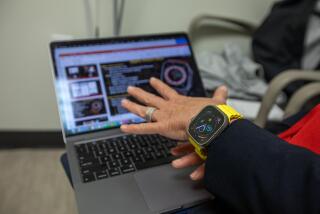Surgeon Predicts Future Wide Use of Mechanical Heart as ‘Stopgap’
- Share via
The Arizona surgeon who performed the controversial artificial heart transplant in Tucson last week said Wednesday he envisions cardiologists using the mechanical pump as a stopgap device while patients wait for donor hearts.
Speaking to reporters in Anaheim, Dr. Jack G. Copeland said that 10 years ago cardiologists formed two “separate camps,” one working on techniques for transplanting human hearts, the other developing artificial hearts. Now, he said, there is “increasing awareness . . . of the need for them together.”
Copeland made his remarks at the annual scientific session of the American College of Cardiology, meeting at Anaheim Convention Center through Thursday.
Last Wednesday, he headed the team of Arizona surgeons that implanted a new type of artificial heart in the chest of a 33-year-old auto mechanic after the patient’s body had rejected a human heart transplanted a day earlier. The artificial heart had not been approved by the federal Food and Drug Administration.
Eleven hours later, doctors removed the artificial heart and replaced it with the heart of a second human donor. The patient, Thomas Creighton, died Friday.
Temporary Substitution
Copeland said he foresees artificial heart devices being used in the future to help patients survive until donor organs become available, or--in a case of reversible heart damage--until the patient’s own heart mends.
He indicated he favored using the artificial heart as a temporary, not permanent, device.
“It’s difficult for me to imagine them (recipients of permanent artificial hearts) having a very good quality of life,” he said.
Although the operation last week ran afoul of FDA regulations, Copeland said he realized the agency’s job is “essentially impossible” because it is under “pressure from all sides to make sure things are perfect . . . .
“I believe what’s necessary is a little more balance . . . so that the technology is more available.”
‘A Semantic Problem’
Heart surgeons are “caught in a semantic problem,” he said, because they now perform many other stopgap procedures to allow patients to survive until their hearts mend or donor organs are located--procedures that are not FDA-regulated.
“If you call what we do a total artificial heart (implant), it raises a considerable amount of interest, and almost hysteria. But the same kind of concept is being used almost every day to support patients” suffering from heart disease, Copeland said.
He said most cardiac surgeons, at some point in their careers, have used these “devices and technologies (which) are far superior to the artificial heart, yet they’re being used every day with no (government) control.”
Copeland, who has performed more than 60 heart transplants in the past several years, was invited to address the convention months ago, a spokesman for the American College of Cardiology said. During the press conference, questions about last week’s operation were limited, so that Copeland’s work in human heart transplants could also receive attention.
Copeland noted a “dramatic rise in heart transplantation.” Until last year, he said, there had been perhaps 1,000 heart transplants throughout the world, but last year alone, 440 of the operations were recorded. He added that he believed the actual number was closer to 500.
Organ Supply Is Key
Transplants are gaining acceptance among cardiologists, hospitals, insurance companies and even government programs such as Medicaid, he said.
“In the future, the major impediment will be the unavailability of organs for transplant,” Copeland said. Citing results of a nationwide study, he said there is a “lack of communication” among hospitals about donor organs that costs perhaps 3,000 potential organ donations yearly.
About 75% of Copeland’s transplant patients live more than one year after the operation, an exceptionally high success rate, said Dr. James S. Forrester, assistant director of the cardiology department at Cedars Sinai Medical Center and moderator of the press conference.
Copeland said 90% of transplant patients enjoy a “normal quality of life,” although they must restrict some activities and take drugs to avert the body’s rejection of the new heart.
As to whether the recipients believe the operation is worth the risk and restrictions, Copeland said his patients adopt the attitude that “you live one day at a time, and each day is a bonus.”






